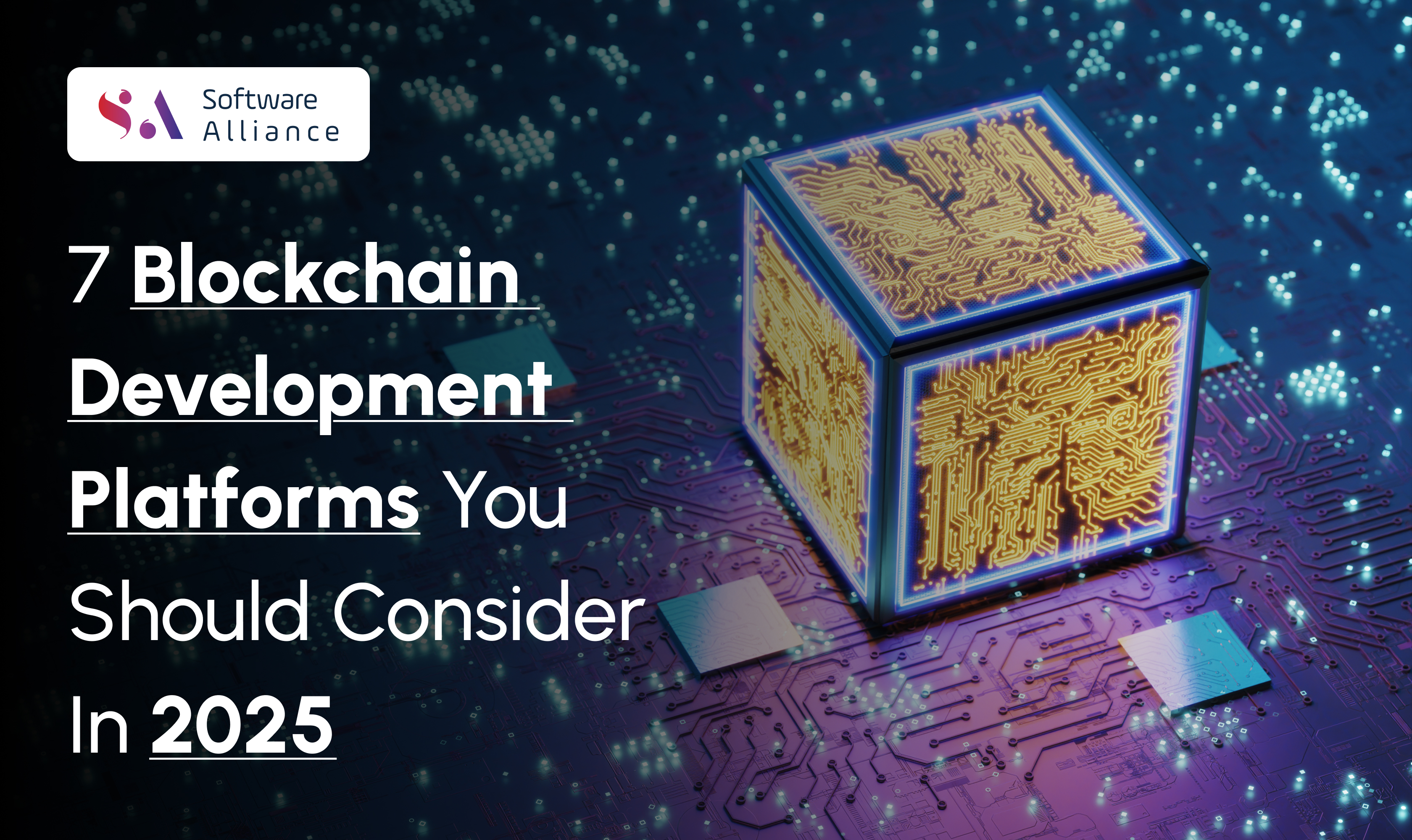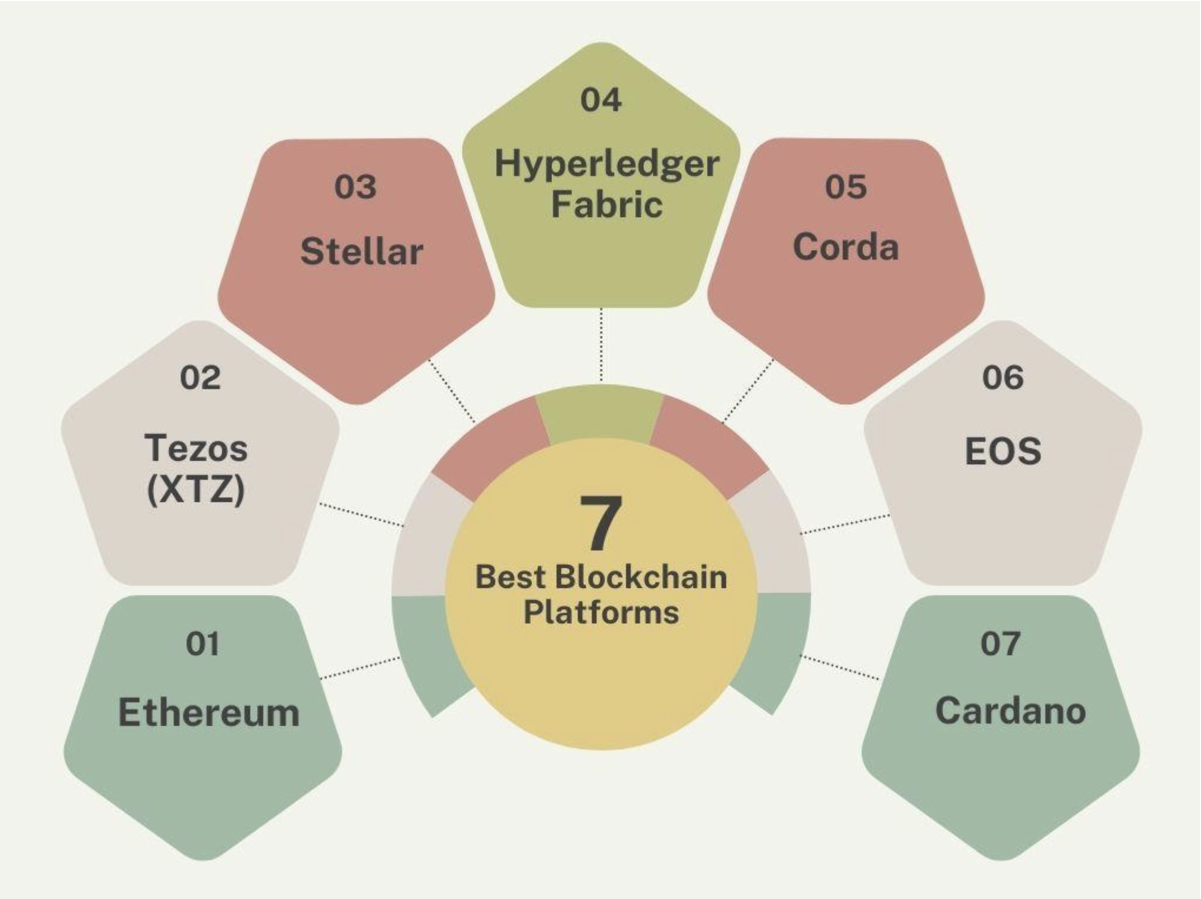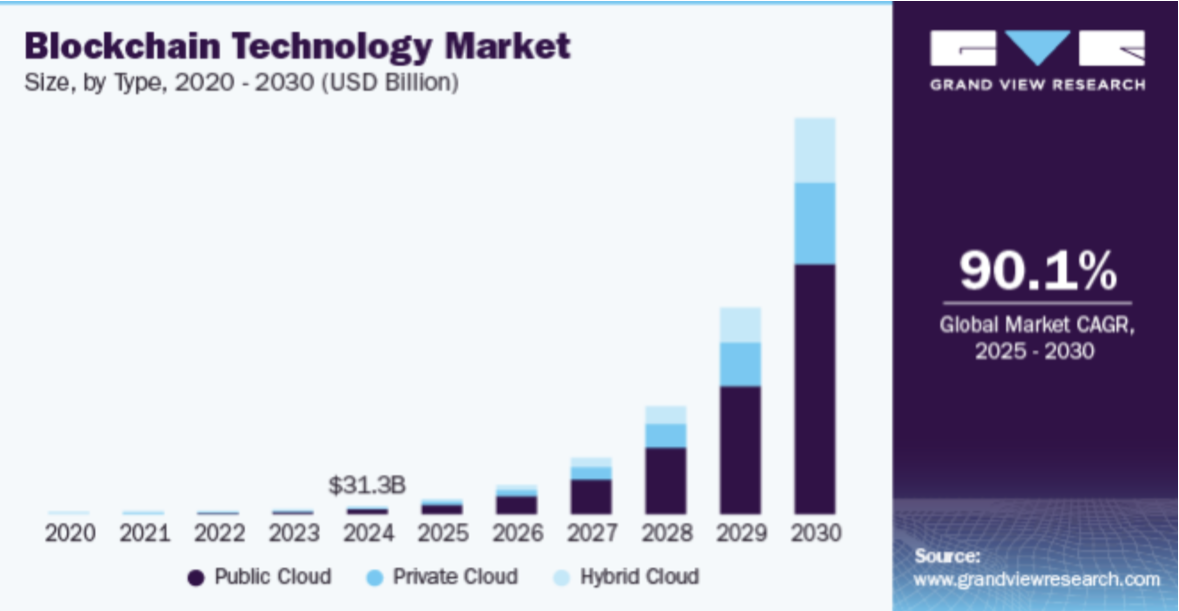
7 Blockchain Development Platforms You Should Consider in 2025
- By: Alice Johnson
- Date: 2024-09-12
Blockchain technology is becoming impeccably popular because of its three prominent qualities - immutability, decentralization, and security.
Besides having massive usage in the financial sector in the form of cryptocurrencies like Bitcoin and Ethereum, Blockchain is being applied in almost every business sector like healthcare, supply chain, real estate,and hospitality.
In the current business scenario, early adopters of blockchain technology are benefitting tremendously in terms of efficiency, productivity, and profitability. Blockchain is helping businesses integrate high-end data security and reduce dependency on intermediaries within their systems.
The fact is that blockchain-powered innovative decentralized apps (dApps), smart contracts, and out-of-the-box financial solutions are currently taking the forefront and enabling businesses to take a secure and systematic approach to customer services.
Also, to make the best use of the amazing capabilities of blockchain technology and achieve desired business goals, choosing the right blockchain platform for projects becomes integral for blockchain development companies.
Selecting the right blockchain development platform is crucial for success. This article explores seven leading contenders for 2025: Ethereum, renowned for its smart contracts; Tezos, prized for its self-governance; Stellar, excelling in cross-border payments; Hyperledger Fabric, offering enterprise-grade solutions; Corda, securing business transactions; EOS, enabling scalable dApps; and Cardano, emphasizing sustainable development. Discover which platform best suits your project's unique requirements.
Every blockchain platform has unique strengths for different business sectors. Therefore, selecting one totally depends on your project requirements and business goals.
This article covers complete information about the top 7 blockchain development platforms you should consider in 2025, which can help you make the right selection. But, before that, let’s go through some basic information about blockchain technology.
What is Blockchain Technology?
Blockchain technology refers to an advanced database mechanism that enables transparency in storing and sharing information across a particular network. The information is stored in blocks that are chronologically linked with each other in a chain. One cannot delete or modify the content stored in blocks without consensus from the network. ,
But how?
Blockchain is based on Distributed Ledger Technology (DLT) consisting of blocks that are connected using cryptography. These blocks contain transaction data and a timestamp (which shows when the data was stored). Each block includes the cryptographic hash of the preceding block, and so once the information in a block is recorded, it cannot be changed without changing the information on its preceding and following blocks.
Therefore, data stored in the blockchain becomes immutable and unalterable, which results in high-end security.
Ever wondered how blockchain technology emerged and grew to reach the level it is today? Let’s briefly look at the evolution of blockchain technology.
How Did Blockchain Technology Evolve?
The evolution of blockchain technology can be segmented into three phases. Let’s have a look at each one of them.,
Blockchain 1.0 - Bitcoin Introduced
In the year 2008, Satoshi Nakamoto introduced Bitcoin, which marked the inception of blockchain technology. During that era, blockchain primarily focused on cryptocurrency that powered financial transactions in which Bitcoin worked as a decentralized digital currency.
Blockchain 2.0 - Ethereum and Smart Contracts Unveiled
In the year 2015, Ethereum was launched by Vitalik Buterin, representing the 2nd phase that included the introduction of smart contracts. This phase extended the use of blockchain from mere financial transactions to decentralized finance and supply chain management.
Blockchain 3.0 - Addressing Scalability and Interoperability Challenges
Blockchain is now able to address scalability and interoperability challenges that previously developed blockchain solutions failed to do. Blockchain networks are now built to handle a huge number of transactions without compromising security and decentralization. Additionally, interoperability protocols are being developed to ensure seamless data exchange and communication between different blockchain networks. In this phase, many enterprises are adopting blockchain technology not only for finance but also to improve efficiency in their supply chain processes, tokenization of assets, and identity verification.
So, now when we know what a blockchain technology is and how it evolved, let’s have a look at its application across various industries.
What are the Applications of Blockchain in Multiple Industries?
Blockchain powers secure transactions, transparent data management, and smart contracts, which can potentially transform the way businesses operate today and in the decades to come. Let’s look at how businesses are adopting this emerging technology in an innovative way, helping them achieve a higher level of productivity and prevent fraud at an extreme level.
Finance
Blockchain’s usage in the finance industry is one of its most popular use cases ever known. It is used by banks, financial institutions, and stock exchanges to manage accounts, online payments, and market trading. Using blockchain technology, Singapore Exchange Limited has solved several challenges pertaining to batch processing and manual reconciliation of all their financial transactions.
Retail
Modern retail companies are using blockchain to track their shipments between suppliers and buyers in the most accurate manner. For example, Amazon sellers are now allowing manufacturers, distributors, shipping companies, and end users to add order tracking information using distributed ledger technology. This helps them to extract 100% accurate information, as this system is based on immutability, which doesn’t allow data to be modified or tampered with.
Energy
Blockchain technology is used by energy companies to build energy trading systems and streamline access to renewable energy. Many blockchain companies specialize in developing trading platforms that are used to sell and purchase renewable energy. For example, there are blockchain-based funding platforms that can help individuals and businesses to raise funds to own solar panels and sell excess solar energy.
Media and Entertainment
Blockchain systems in the media and entertainment sectors are used for protecting artworks, videos, and audio files from copyright infringement. For example, Sony Music Entertainment, Japan, uses blockchain technology to improve the efficiency of its digital rights management. They have successfully used blockchain tools to enhance productivity and decrease costs within their copyright processes.
Manufacturing
Blockchain solutions used in the manufacturing sector help improve supply chain management and enhance security. The companies in the manufacturing sector are now using smart contracts for their legal processes. This has helped them to stay compliant with their industry standards and eliminate all the legal hassles. Moreover, using blockchain solutions has helped them to trace assets accurately and implement systematic processes, enabling them to provide better customer services, stay competitive, and accelerate profitability.
So, these were the main business sectors that have already started applying blockchain technology within their processes. Let’s now move to the main topic of this article, which is the 7 blockchain development platforms you should consider in 2025.

7 Blockchain Development Platforms: Which ones should you consider in 2025?
According to a recent statistical report, the blockchain market is expected to rise from $4.0 billion in 2021 to $57.4 billion by 2026. This shows the increase in usage of this technology within different business sectors. But, with so many platforms available, which ones should you consider for your business that can help you compete in the current market? Here are the details about the 7 blockchain development platforms that can help you answer this question.
#1 Ethereum
Ethereum is considered the second-largest cryptocurrency in the world. It is an open-source, decentralized blockchain platform used to build and run applications without a central authority. Using Ethereum, developers can create DeFi (decentralized) applications that deal with property rights and real estate transactions.
Ethereum-powered applications enable users to create and exchange NFTs (non-fungible tokens). The transactions done on this type of platform are immutable and securely distributed across the network, making them extremely secure. Additionally, the applications built using Ethereum can be created and used without any intermediaries.
#2 Tezos (XTZ)
Tezos is an open-source blockchain platform known for its special qualities like governance and user participation. Using this blockchain platform, users can seamlessly connect with each other over a decentralized network and exchange information without the need for intermediaries. The digital token of Tezos is known as Tezzie or Tez.
Tezos offers similar features to other cryptocurrencies. However, its operations differ from other cryptocurrencies as it is not only decentralized but is also self-governing. Automatic upgrades facilitated by Tezos make it unique for crypto enthusiasts. Also, network participants can vote for or against the proposed updates, providing extreme flexibility and security at the same time.
#3 Stellar
Stellar is a public blockchain platform that empowers developers to unlock economic and human potential. It is a decentralized network that can help in creating experiences that are more like cash rather than crypto. Compared to other blockchain-based systems, the solutions built using Stellar are cost-efficient and energy-effective.
The decentralized Stellar network has the potential to create opportunities across borders as it offers tools that can integrate with financial assets, build practical and intuitive solutions that can help people to access global financial markets. Basically, it helps in harnessing the power of cross border payments globally with 24/7/365 settlement in the most secure manner.
#4 Hyperledger Fabric
Hyperledger Fabric is an enterprise-grade, open, distributed ledger platform that has advanced privacy controls, which enable you to restrict data sharing permissions. It allows only the permissioned, authentic network participants to access information. Hence, it enables you to share only the information with specific users you want to, which enhances the security of your data.
Using Hyperledger Fabric, you can conduct trackable and irreversible transactions, which helps create trust between organizations and enables businesses to make informed decisions quickly. This helps them lower costs, save time, and reduce risks. It includes pluggable architecture that enables you to tailor blockchain solutions instead of implementing one-size-fits-all applications.
#5 Corda
Corda is a blockchain platform that is based on Distributed Ledger Technology (DLT). It is an open-source permissioned solution that allows businesses to conduct transactions in an extremely secure manner. It also applies smart contracts, which can help businesses in digitally defining and agreeing to the terms and conditions before associating or partnering with each other in the most secure way.
Additionally, Corda uses cloud-native technologies, which makes it scalable and configurable. It uses a common layer of identity, consensus, and governance well known as Corda Network. Corda is a highly secure platform that can prevent malicious activities that lead to tampering or deleting data and therefore has been proven to be the best blockchain platform for streamlining business operations.
#6 EOS
EOS is one of the best blockchain platform which helps users to develop decentralized applications dealing with cryptocurrency and exchange data and value. It applies a Delegated Proof of Stake (DPoS) with consensus mechanism allowing token holders to elect node operators. Also, it is powered by the EOS Virtual Machine with WebAssembly engine that allows fee-less transactions.
Being scalable, programmable, and divisible, EOS has been proven to be compatible for a wide range of blockchain applications. It supports authentication, permissions, data hosting, secure access, and communication between dApps and the internet. Precisely, EOS can be applied to build user-friendly and business-friendly apps, overcoming all the challenges of traditional blockchain platforms.
#7 Cardano
Cardano is an open-source proof-of-stake (PoS) blockchain platform that applies ADA cryptocurrency to support dApps, smart contracts, and more. It enables faster transactions at lower fees than Bitcoin. It was first developed using evidence-based methods. It collaborates with pioneering technologies to penetrate security and sustainability within decentralized applications, systems, and tools.
Using Cardano, ADA tokens can be used to pay transaction fees and earn rewards. The best thing is users can participate in staking pools along with other token holders. The more tokens a user is able to stake, the more likely they are allowed to validate transactions. Also, when a user validates a transaction, they are given more ADA tokens. This makes it a perfect choice for enterprise-level decentralized (DeFi) platforms and smart contracts.
Hence, with so many blockchain development platforms available, it is obvious that the hype around blockchain technology is increasing consistently in the coming years too. Let’s have a look at what the future holds for blockchain and how it is making changes for the better.
What is the Future of Blockchain Technology?
Blockchain technology is expected to prominently impact businesses all over the world by allowing transparent, secure, and efficient transactions across multiple industries. Because of its decentralized ledger, systems will no longer be needing intermediaries for conducting transactions and executing smart contracts. This will help them improve integrity, reduce costs, and establish trust between the parties involved. The major business sectors where blockchain usage would be improving include finance, supply chain management, healthcare, and identity verification. These businesses would benefit from blockchain applications in terms of real-time tracking of assets, secure data management, streamlined payment processing, fraud detection, and prevention.
Therefore, the future of blockchain applications in various business sectors is bright, which can be proven by a recent report that says —
The global blockchain technology market size was around USD 31.28 billion in 2024, which is expected to rise at a CAGR of 90.1% from 2025 to 2030.

Source: Grand View Research
Conclusion
Basically, blockchain platforms are here to transform different business sectors in 2025 and beyond. It is also true that early adopters of blockchain technology will stay ahead of the competition. Here, we have discussed information about the top 7 blockchain development platforms, which will help you make selections and the right decisions based on your business requirements, infrastructure, resources, and goals.
If you are still perplexed about which platform to choose and the features to include in your blockchain application to help you achieve your business goals, you can consult blockchain experts at Software Alliance. Partnering with them for your Blockchain project can help you gear towards gaining a better understanding of the features and benefits of each of these platforms. Also, they can help you explore the possibilities and feasibilities suiting your business type and make the most out of them.
Furthermore, the below-mentioned FAQs can also help you get a better idea of the blockchain platforms and clear all your doubts.
FAQs
What is a Blockchain Platform?
A blockchain platform is a tool that is utilized to streamline the process of building blockchain applications and services. It is a framework that helps in developing blockchain applications that are used by businesses to deal in cryptocurrencies, smart contracts, and improve operational efficiencies.
Why is Using a Blockchain Platform Significant?
The blockchain platform enables businesses to develop apps with efficiency and confidence. Most of the blockchain platforms provide 24/7 support, and that makes it easy for developers to learn and manage version upgrades easily and build required apps quickly, ultimately helping to save costs.
Can I Use a Blockchain Platform Without Knowing How to Code?
Yes, you can build blockchain applications using a no-code blockchain platform like Stellar using its “Stellar Asset Sandbox.” It provides a user-friendly interface that enables beginners in blockchain technology to build decentralized applications with minimal coding knowledge. However, building complex blockchain applications would require having strong coding skills, so it depends on the type of app you are building.
What Factors Should I Consider Before Selecting a Blockchain Platform?
Below are some factors that you need to consider before selecting a blockchain platform:
Scalability: Select a blockchain platform that has room for growth and scalability for your application in the future.
Privacy: If your data requires not to be shared publicly, ensure that the blockchain platform you choose helps you implement required restrictions and permissions to access the data.
Fees: Check the fee structure your blockchain platform follows - whether static or dynamic. Every transaction requires paying fees in the form of cryptocurrency or similar. So, you need to verify and ensure it suits your requirements before making the selection.
Digital Assets: You need to check which digital assets fit into your business strategy and choose a blockchain platform that supports those digital assets.